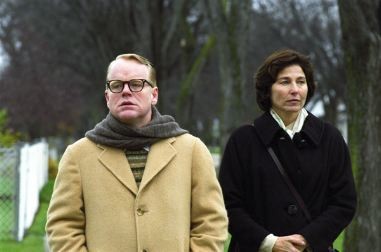Celebrity reporter

Based on Gerald Clarke’s exhaustive biography, Bennett Miller’s Capote covers the six years that Truman Capote spent working on In Cold Blood. The film begins at a noisy New York cocktail party where Capote is the center of attention, regaling his friends with humorous anecdotes and observations. Then he runs across a newspaper article about the murder of four members of the Clutter family in Holcomb, Kansas. He calls William Shawn, editor of the New Yorker, to say that he wants to go to Kansas to write about this story.
It’s not clear why Capote, author of such celebrated fictional works as Breakfast at Tiffany’s, is drawn to this grim subject. The film suggests he is looking for a new direction in his writing, a literary road less traveled that combines fiction and journalism. We also sense that he needs to prove to himself that he has the writing chops to take on such a subject. “Sometimes, when I think how good it could be,” he says, “I can hardly breathe.”
The film tracks Capote’s relationship with Alvin Dewey, a hard-working agent for the Kansas Bureau of Investigation and a good friend of the murdered Herb Clutter. Various other subplots are introduced, almost all of them involving people who are used or abused as they are pulled into Capote’s self-centered world. They include his longtime companion Jack Dunphy, whose own problems always take a backseat in their relationship; the residents of Holcomb, who are seduced by Capote’s aura of celebrity; and Harper Lee, a childhood friend who accompanies him on his first trip to Kansas in 1959. The success of Lee’s 1961 novel To Kill a Mockingbird (its character Dill was modeled on Capote) makes Capote more bitter than proud.
The key relationship in the film is between Capote and Perry Smith, the smarter and more sensitive of the two killers, whose childhood background of abandonment parallels Capote’s. Though we never quite understand how Capote is responding to Perry’s entreaties for friendship and understanding, we do come to realize that Capote’s hunger for wealth and fame trumps his other emotions, whether those are of guilt, shame, remorse or love.
Capote realizes that the most dramatic ending for his book would involve the killers’ executions. When he finally witnesses an execution, it is more than he bargained for. “There was nothing I could do to save them,” he insists afterward. “Maybe not,” Lee points out, “but the truth is, you didn’t want to.”
Much of the strength in Capote comes from Miller’s precise direction, Dan Futterman’s highly visual screenplay, cinematographer Adam Kimmel’s inspired use of long shots, and a slew of convincing supporting players, especially Clifton Collins Jr. as Smith and Catherine Keener as Lee. But what ultimately makes the film magnificent is the stunning performance by Philip Seymour Hoffman. It’s not just that he captures Capote’s squeaky voice and fey movements; he also offers a catalogue of ambivalent reactions and faraway stares which convey Capote’s response to moral quandaries. Whether he is holding court with a glass of booze in hand or staring through bars at a frightened man about to die, Hoffman presents us with a complex, talented man seeking to validate his art. It is one of the great film performances of the past decade.



